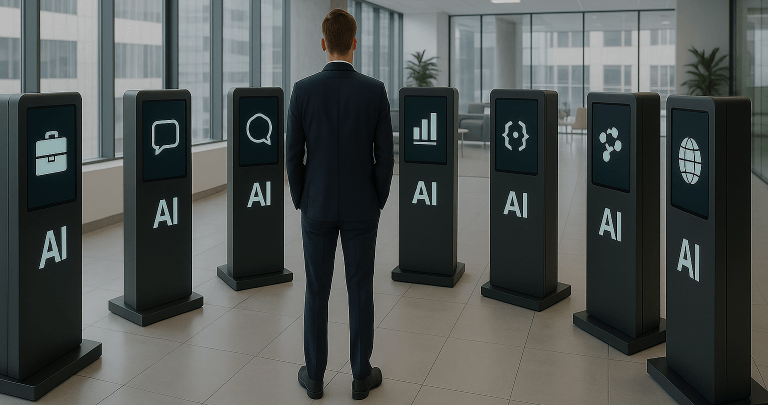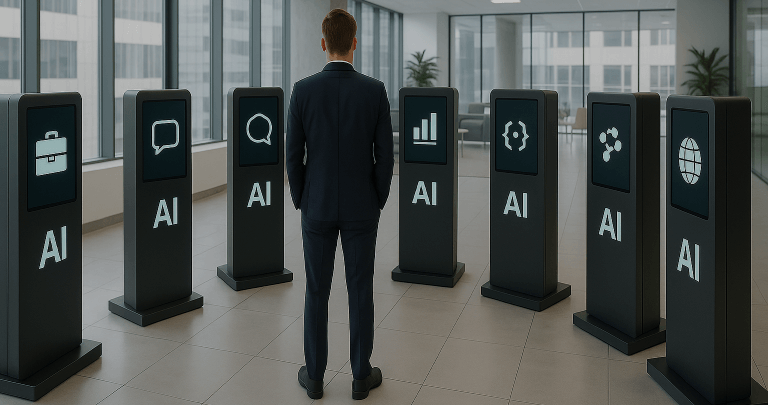Discover how AI agents are transforming industries and which type would be more recommended for your specific project


Recently much has been talked about AI Agents (Artificial
Intelligence Agents). It seems agents are the most important theme right now, not only in the AI industry, but for all companies.
This probably is because of the expanded scope agents can reach in projects inside corporations, while single agents can handle
specific tasks, the real power comes when specialized agents collaborate to solve complex problems. Some call Agent Transformation,
Agent Adoption or the “Agentification” of the Economy, but besides the name, AI Agents became part of the day-to-day
operations for any company.
Andrew Ng, the outspoken AI brain behind many new
entrepreneurs, startups and new business models, was talking about agents for a while, and, as always in the AI field, his
predictions came true [1]. Today we live in the AI Agent Era. Recently, The Information published a good piece about the subject
[2], which sparked some discussion [3] [4].
Simply put, an AI agent is an intelligent software
system designed to autonomously perform multi-step tasks and pursue specific goals without constant human intervention. Unlike
basic chatbots, these agents possess advanced reasoning, planning, and memory capabilities, allowing them to learn, adapt,
and make decisions independently. The web is now bustling with mainly seven distinct kinds of AI agents, each serving a unique
purpose and offering unprecedented opportunities for innovation.
In short, the seven types of AI agents are:
1. Business-task agents
2. Conversational agents
3.
Research agents
4. Analytics agents
5. Developer agents
6. Domain-specific agents
7. Browser-using agents
Now, let's delve into these seven transformative
categories of AI agents, understanding how they're reshaping operations across various sectors.
1.
Business-task agents
Business-task agents operate across various enterprise
software platforms to handle administrative and operational workflows. By automating tasks such as invoice processing, document
classification, scheduling, and data entry, these agents drastically reduce manual overhead.
Examples: UiPath, Microsoft Power Automate, Zapier
integrated with AI.
Use cases: Invoice processing, data entry, internal
scheduling.
These agents free up employee time and ensure greater
accuracy and consistency across routine but essential tasks, making them an indispensable component of enterprise automation.
2.
Conversational agents
Conversational agents are AI-driven chatbots that
engage users through natural dialogue. Far beyond basic FAQ bots, they can resolve complex customer service inquiries or assist
employees with IT and HR-related issues by navigating systems and providing real-time solutions.
Examples: Google Dialogflow, Microsoft Dynamics
365, Amazon Lex, Salesforce Agentforce, ServiceNow Now Assist.
Use cases: Customer support, IT service tickets,
HR inquiries.
They offer round-the-clock support, improving both
the customer and employee experience while reducing the burden on human support teams.
3.
Research agents
These agents are specialized in retrieving, analyzing,
and synthesizing information from authoritative sources. Whether parsing academic literature, web content, or technical documentation,
research agents can generate citations, verify facts, and even answer highly technical questions.
Examples: OpenAI Deep Research, Perplexity Pro,
Scite Assistant, Elicit, AlphaSense.
Use cases: Research compilation, citation generation,
technical inquiry resolution.
Ideal for industries that demand high accuracy—like
academia, legal, or scientific fields—research agents serve as tireless knowledge workers.
4.
Analytics agents
Analytics agents are designed to interpret structured
data, generating charts, dashboards, and reports with actionable insights. These agents empower business users to explore
data without deep technical knowledge, democratizing access to analytics across organizations.
Examples: Power BI Copilot, Tellius, ThoughtSpot,
Glean.
Use cases: Business intelligence, performance monitoring,
trend analysis.
By turning data into decisions, these agents help
organizations stay agile and informed in an increasingly data-driven landscape.
5.
Developer agents
Built for software engineering tasks, developer
agents go beyond code suggestions to complete coding tasks such as debugging, documentation, and even full-feature implementation.
They reduce development time and can often work for extended periods without supervision.
Examples: GitHub Copilot, Q Developer, Claude Code,
Devin (Cognition), Cline.
Use cases: Code generation, debugging, software
documentation.
These agents are revolutionizing the software development
lifecycle, making engineering teams more productive and reducing dependency on large developer teams.
6.
Domain-specific agents
Tailored for regulated or high-stakes sectors like
healthcare, law, or finance, domain-specific agents integrate specialized knowledge to assist professionals with tasks that
require expert-level understanding and compliance.
Examples: Harvey (legal), Hippocratic AI (healthcare),
Vic.ai, Rogo, Hebbia (finance).
Use cases: Contract review, medical triage, compliance
analysis.
These agents are trusted partners in environments
where precision and accountability are critical, acting as intelligent assistants to professionals rather than replacements.
7.
Browser-using agents
These agents simulate human-like web interactions,
completing tasks such as filling out forms, ordering products, or publishing content. By navigating the web autonomously,
they handle tasks traditionally assigned to human assistants.
Examples: OpenAI Operator, Google Project Mariner,
Anthropic Computer Use.
Use cases: Online purchasing, form submission, content
creation.
With the ability to operate within existing digital
ecosystems, browser-using agents extend automation to a broad array of user interfaces and workflows.
Visionnaire: pioneering the future with AI
At Visionnaire, we don't just talk about the future
of AI; we build it. Our AI Factory specializes in harnessing the power of these diverse AI agents to propel businesses of
any sector and size to unprecedented levels of success. With nearly three decades of experience in software development and
a visionary approach to technology, Visionnaire is uniquely positioned to guide your company through the AI revolution.
We understand that embracing AI means more than
just implementing a new tool; it's about integrating intelligence into the very fabric of your operations. Visionnaire offers
tailored AI solutions, from custom AI software projects and advanced data analysis with deep learning to natural language
processing and expert AI consulting. We leverage the best AI models in the world, including OpenAI, Anthropic, Google Gemini,
and more, ensuring that your solutions are not only cutting-edge but also perfectly aligned with your specific business needs.
Our agile development process, combined with our
profound AI expertise, guarantees timely delivery and flexible solutions that adapt to your evolving requirements.
Whether you aim to optimize customer experience with conversational interfaces, automate intricate processes, or gain deeper
insights from your data, Visionnaire provides the practical, results-driven AI solutions that will give you a decisive competitive
edge.
Don't wait to enter the era of intelligence—Visionnaire
helps you get ahead, transforming your challenges into opportunities for growth and innovation. Click here to learn more.
This classification of AI agents is based on
the insightful work of Aaron Holmes for The Information, a leading source for in-depth technology news and analysis. You can
read the original article here.
[2] The Seven Kinds of AI Agents. The Information.
[3] Types of AI Agents: Definitions, Pros, Cons & Use Cases. AI21.
[4] What Are The 7 Types Of AI Agents? Forbes.




